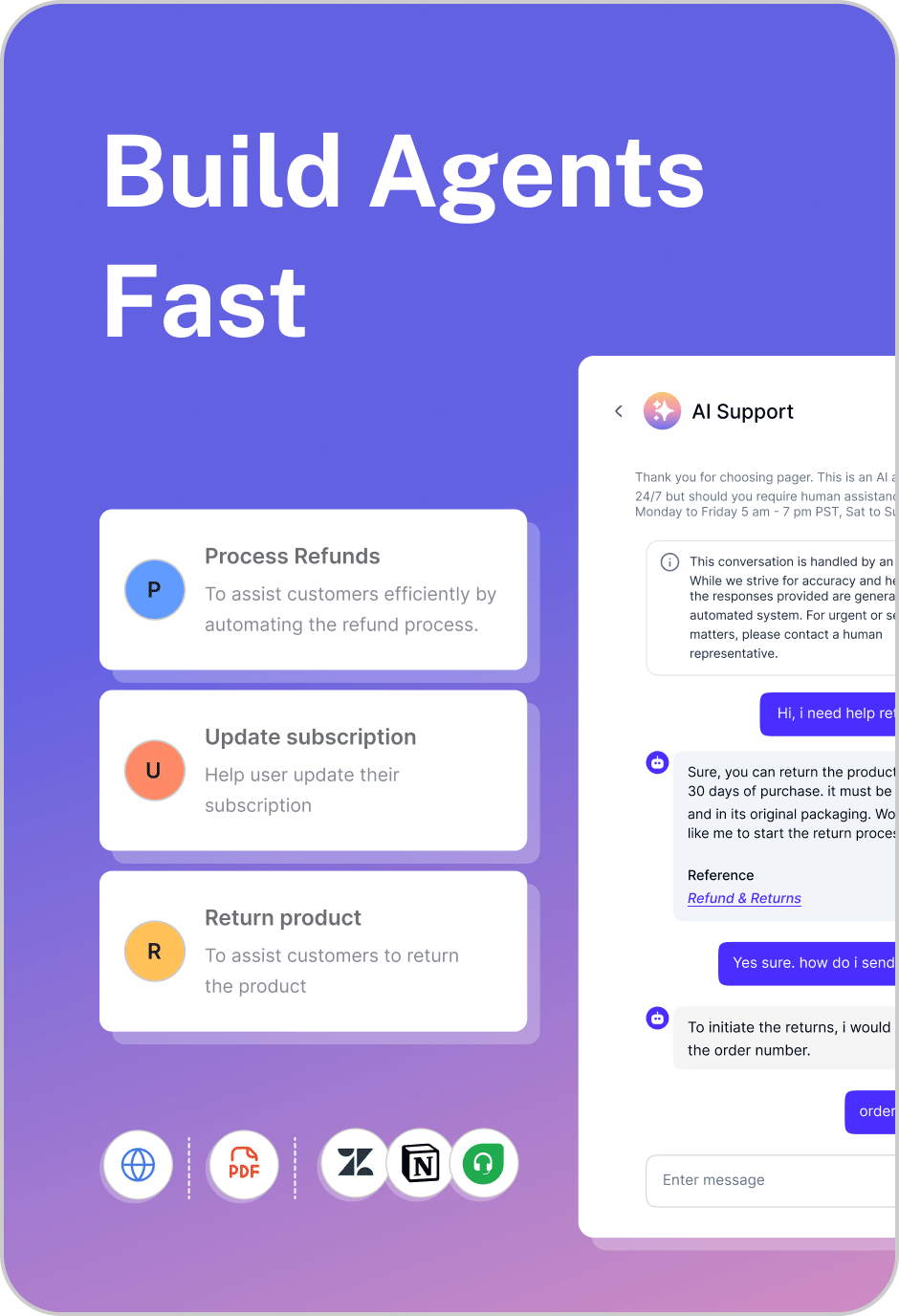
Top 12 Chatbots for Customer Service in 2025
Looking for a reliable AI chatbot for customer support? We’ve reviewed 12 top tools for 2025 to help you cut tickets, boost CSAT, and scale support easily.
Key Takeaways
Chatbots → AI agents is the big shift : Modern agents understand intent, use tools (refunds, bookings, lookups), and complete workflows end-to-end—not just answer FAQs.
What to look for : No/low-code setup, deep CRM/helpdesk integrations, omnichannel + multilingual support, robust analytics/observability, and strong guardrails/compliance.
Proven impact : 24/7 self-service, lower ticket volume and handling time, higher CSAT; track FRT, resolution rate, deflection, sentiment, and unresolved trends to optimize.
Best tools, clear leader : We compared 12 platforms; pagergpt stands out for agentic workflows (Agent Studio, shared inbox, multi-LLM, AI copilots). Pilot 1–2 use cases, then scale
Struggling to find the right customer service chatbot?
You’re not alone. With so many tools on the market, it’s hard to know which ones are worth your time and which actually help your team to meet customer expectations.
Whether you want to offer better self-service, cut down support tickets, or stay available around the clock, the chatbot you choose matters. In this guide, we’ve reviewed 12 of the best customer service chatbots to help you make the right call in 2025.
Let’s dive in.
What is a customer service chatbot?
A customer service chatbot is like a virtual assistant that helps answer questions, resolve issues, and guide users through support processes.
In the past, most chatbots could only handle basic tasks like answering FAQs or sending automated emails. Their responses were limited to what they were explicitly trained on, and when asked something beyond their training data, they’d often fall short with answers like “Sorry, I don’t understand.”
That’s no longer the case.
Evolution of customer service chatbots to AI agents
Customer service chatbots have evolved through three main stages: rule-based chatbots → generative AI chatbots → AI agents.
Each stage brought new capabilities and fundamentally changed how support teams operate.
Let’s understand how:
Rule-based chatbots
Rule-based chatbots relied on rigid decision trees and scripted responses. Their knowledge was fixed, and anything outside the script triggered replies like “Sorry, I don’t understand.” They worked only when the user’s query matched a pre-set keyword or command.
For example, if a customer typed “reset password,” the bot would provide a link. But if they said “I can’t log in because I forgot my password,” it might fail with “Sorry, I don’t understand.”
Generative AI chatbots
The introduction of large language models (LLMs) allowed chatbots to understand natural language, pull answers from broad data sources, and hold more human-like conversations.
They improved accuracy and could assist support teams with tasks like email drafting, summarizing conversations, and analyzing data. But they still couldn’t take meaningful actions or complete workflows end-to-end without human help.
AI agents
With the rise of agentic AI, customer service chatbots have evolved into much more capable autonomous agents. They can now manage multi-step conversations, understand intent, take action, and respond to context in real time, all without human involvement.
For example, instead of simply sharing a password reset link, an AI agent can verify the user, complete the reset, and confirm the update in the same conversation. If a refund is requested, it can check the order, validate the request, and process it automatically.
That level of automation is why more businesses are turning to AI agents to streamline customer support and scale operations. As this shift continues, a growing number of tools have emerged specifically designed for agentic workflows.
In the next section, we’ll look at the customer service chatbot platforms leading the way.
Quick overview of top chatbots for customer service
Tool | Best for | Key features | Starting price |
Agentic workflows, AI+human collaboration, scaling self-service | No-code Agent Studio, AI copilot, multi-LLM support, shared inbox, ticket routing, smart escalations | $0/month | |
Zendesk | Teams using Zendesk suite | AI agent reasoning, AI insights hub, multichannel support | $19/month |
Fin AI (Intercom) | Agent + AI collaboration | AI copilot, multilingual support, human handoff | $29/month |
Ada | Self-service at scale | Reasoning Engine, sandbox testing, multilingual support | Custom pricing |
Freshchat | Fast-growing support teams | Freddy AI, intelligent routing, workflow automation | $19/agent/month |
Botsonic | Startups and marketers | No-code builder, multilingual support, chatbot customization | $16/month |
Chatbase | Data-rich chatbot deployment | Smart escalation, chatbot analytics, AI actions | $40/month |
Watermelon | Omnichannel automation | Shared inbox, multilingual AI, WhatsApp + Messenger integration | €106/month |
Aidbase | SaaS & eCommerce startups | FAQ training, knowledge gap detection, unified inbox | $22/month |
CustomGPT | Multimedia + complex ingestion | Multi-LLM support, OCR, advanced analytics, 1400+ file types | $89/month |
Zia (Zoho) | Zoho ecosystem users | Sentiment analysis, blueprint workflows, seamless native integrations | $9.52/user/month |
Botpress | Complex enterprise workflows | LLMz engine, custom actions, role-based access control | $0/month |
12 Best customer service chatbots in 2025
Below, we’ve rounded up 12 of the best AI-powered customer service chatbot platforms with their key features, pros, cons, and pricing.
pagergpt
pagergpt is a platform purpose-built for forward-thinking customer support teams who aim to scale support with intelligent automation, improve team productivity, and provide personalized experiences at scale.
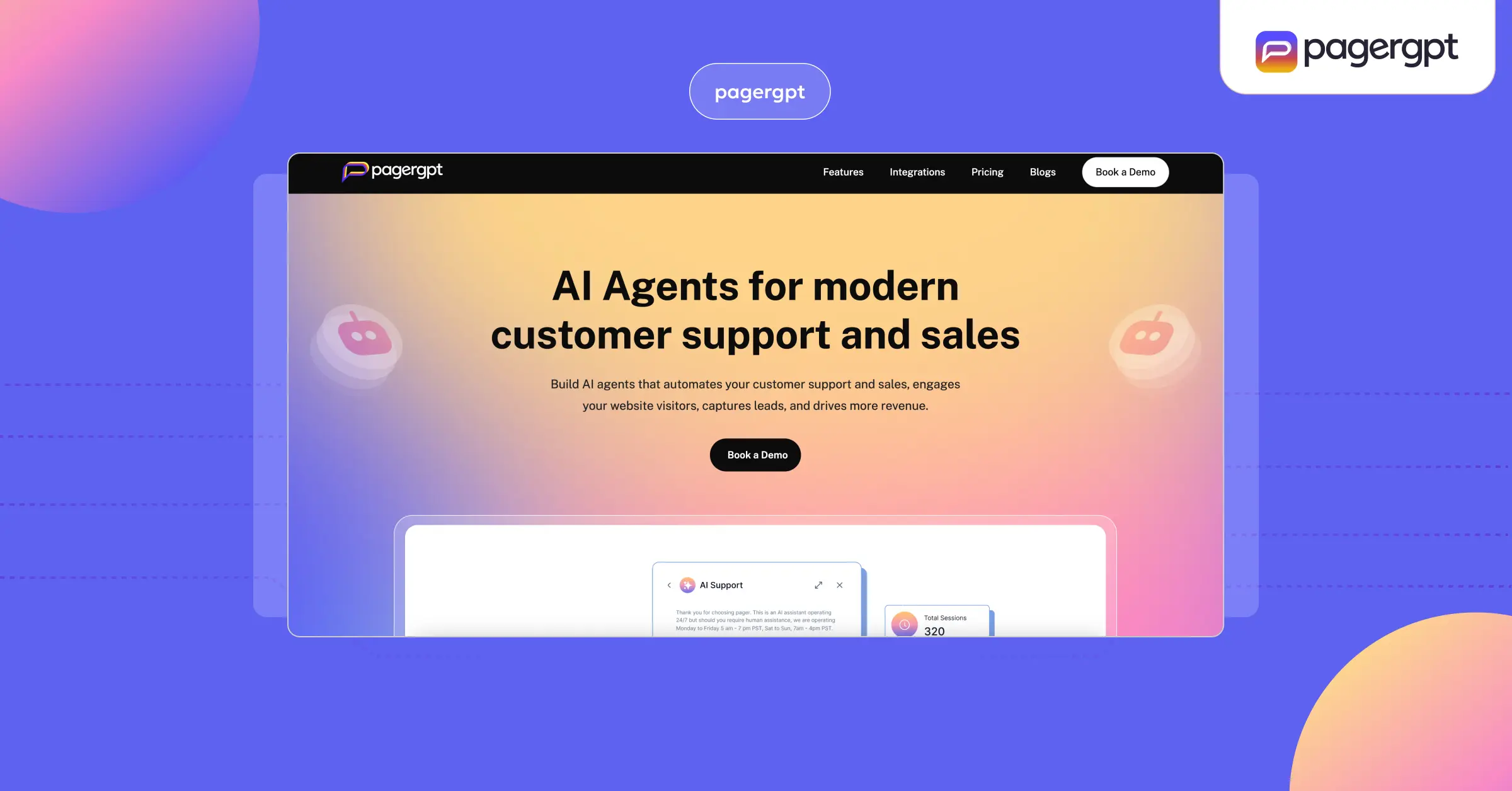
Within our no-code AI Agent Studio, you can quickly build and deploy AI agents trained on your company data to handle routine questions, route tickets, and deliver fast, accurate responses across live chat, email, and social channels.
pagergpt offers a wide range of tools and features, including a shared live inbox, AI copilots, and custom workflows, that help your team stay productive and deliver top-notch customer experience 24/7.
Key features of pagergpt:
Multi-LLM Model: With pagergpt, you can choose from multiple LLM models, including Mistral, OpenAI, Gemini, and Claude, to work with the one that best suits your business needs.
Multichannel and multilingual support: The platform allows you to deploy agents across all major communication channels and respond in over 95 languages, creating a more accessible and localized support experience.
Shared live inbox: All messages from multiple channels flow into one collaborative inbox. Human agents can jump in, view chat context, and @mention teammates to resolve issues collaboratively.
AI copilot: The AI Co-pilot helps support agents by suggesting replies, surfacing past chats and documents, and recommending actions in real-time to speed up responses and improve customer interactions.
Advanced analytics dashboard: pagergpt gives you a glass pane view into your support activities. Track sentiment, resolution rates, response times, and visitor engagement. These insights help you refine workflows, optimize bot performance, and measure support impact.
Pros
No-code setup: 100% no-code setup enables non-technical teams to use the platform without any hindrance.
Fast implementation: You no longer need to wait months to go live with AI agents, as the platform provides industry-ready templates and plug-and-play components, speeding time to value.
Flexible integrations: Allows you to automate payments, onboarding, and password resets all in one platform.
Cost-effective scaling: Affordable pricing tiers keep overhead low as ticket volumes grow.
Accurate, brand-aligned responses: Agentic retrieval-augmented generation ensures responses stay accurate and on brand.
Cons
Limited documentation: The platform currently has limited documentation, which may complicate the setup process, requiring trial and error. But you can always reach out to pagergpt customer support for guidance.
Limited pricing details: Pricing details beyond the standard plans can be unclear without a custom quote.
Pricing
Magic plan: $0/month with unlimited messages for 100 sessions, 1 chatbot, 1 admin with potential to customize as needed
Business Plan: $349/month with live chat inbox and unlimited messages for 1k sessions
Enterprise: Custom pricing.
Want to see pagergpt in action? Try now for free
Zendesk
Zendesk has integrated AI agents within its support ecosystem, with advanced reasoning, actionability, and adaptability to meet customer support expectations. These agents handle multi-step conversations, ask follow-up questions, draw context from existing help content, and invoke system actions when needed.
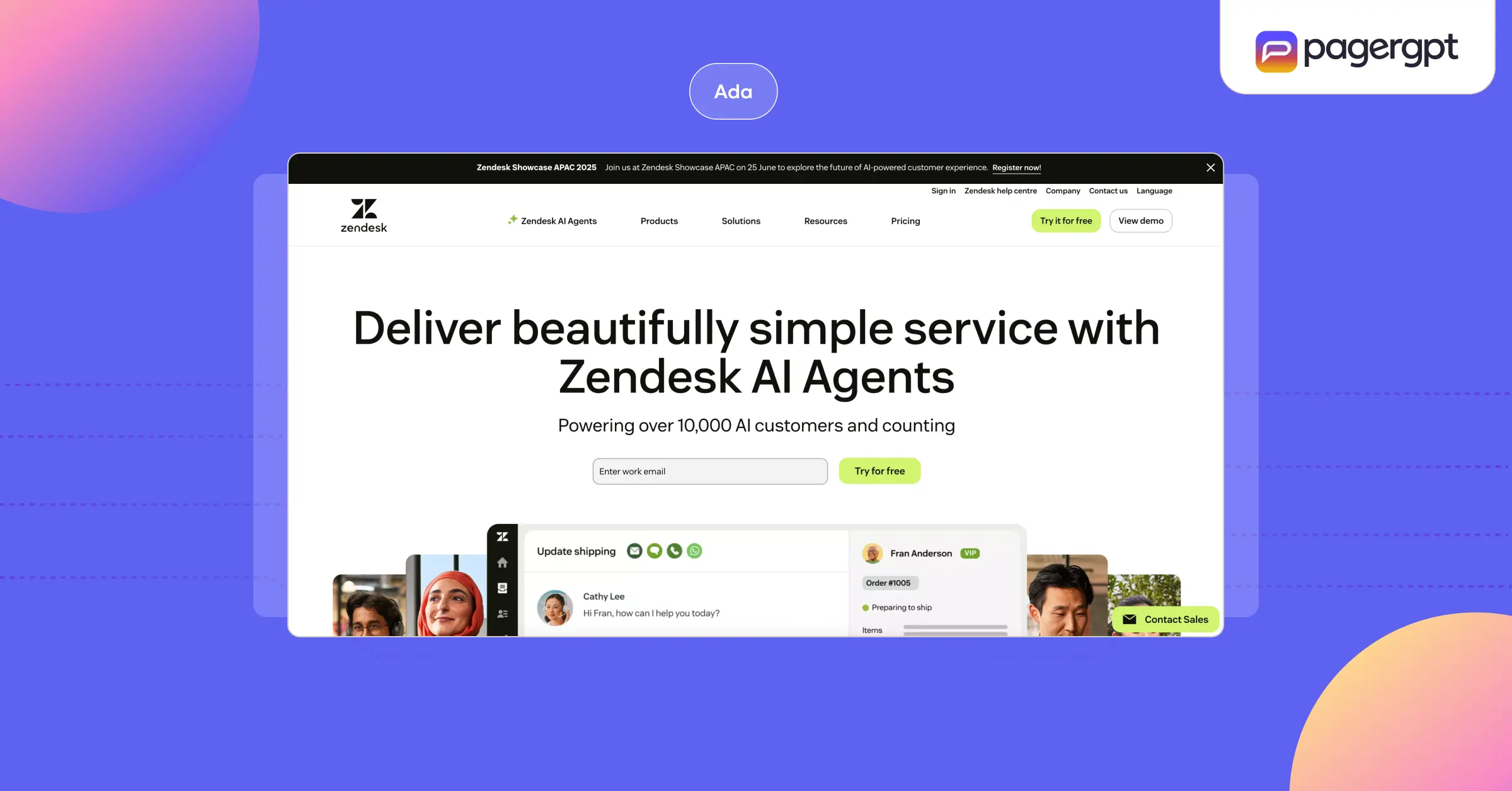
Key features of Zendesk:
Autonomous resolution-first workflows: Unlike simple bots, Zendesk AI agents can reason, ask clarifying questions, and take action. They’re trained to resolve up to 80% of interactions automatically, reducing agent load and response times substantially.
AI Insights Hub: You get a central dashboard for monitoring agent performance, reasoning traces, sentiment scores, and automation outcomes.
Multi-channel reach: Zendesk supports messaging, email, chat widgets, voice, and social media channels like WhatsApp and Facebook Messenger.
Pros
Ease of implementation: Zendesk provides easy-to-use, no-code components for creating and managing AI workflows in customer support.
Continuous learning: Zendesk AI agents utilize continuous learning, leveraging machine learning to enhance accuracy and effectiveness.
Cons
Developer reliance for customization: Advanced customizations often require technical resources.
Limited ticket hierarchy: Zendesk lacks built-in ticket duplication and parent-child structures, making it harder to manage related issues.
Pricing
Support Team $19 /month
Support Professional $55 /month
Support Enterprise: $115/month
Fin AI by Intercom
Fin AI by Intercom is an AI agent focused on resolving customer queries and enhancing the overall support experience. The platform works natively within Intercom’s helpdesk and integrates smoothly with other known customer service tools like ZohoDesk, Zendesk, and Salesforce. Fin can handle multilingual conversations in over 45 languages, making it a strong fit for global support teams.
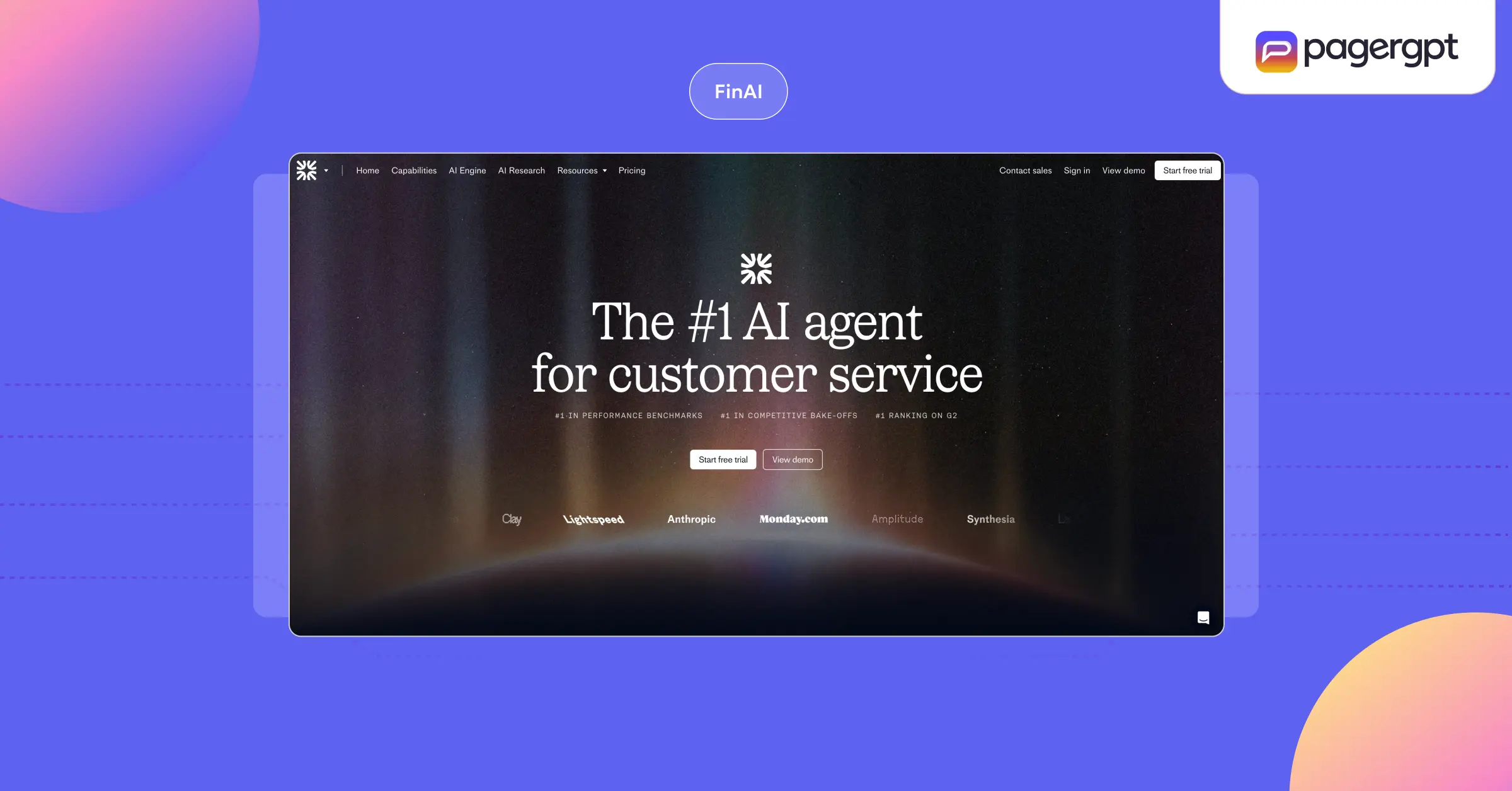
Key features of Fin AI:
Multi-source generative answers: Fin AI constructs answers using relevant information from multiple knowledge sources, allowing it to create more comprehensive responses and enhancing its ability to solve complex questions.
Human handoff: You can configure how and when Fin AI triages conversations or hands off to your human support team.
AI copilot for agents: The platform helps improve agent productivity by offering an AI copilot that provides instant responses and conversation history, and enhances the customer experience.
Pros
Easy to deploy: Intercom’s Fin AI provides a no-code framework to get things up and running instantly through flexible knowledge training.
Excellent language support: The platform supports over 45 languages, including Croatian, Czech, Danish, Dutch, and Estonian.
Cons
Limited merging capabilities: The process of merging duplicate contacts or conversations is less efficient and flexible than in other CRM platforms, which can slow down the data cleanup process.
Steep learning curve: New users may initially find the platform overwhelming due to the range of features and settings.
Pricing
Essential: $29/month per seat (billed annually) or $39/month per seat (billed monthly)
Advanced: $85/month per seat (billed annually) or $99/month per seat (billed monthly)
Expert: $132/month per seat (billed annually) or $139/month per seat (billed monthly)
Ada
Ada is an AI customer support tool built to automate high volumes of inquiries using AI agents. It’s designed for scalable self-service, helping teams resolve common issues faster, reduce agent workload, and support customers across multiple channels.
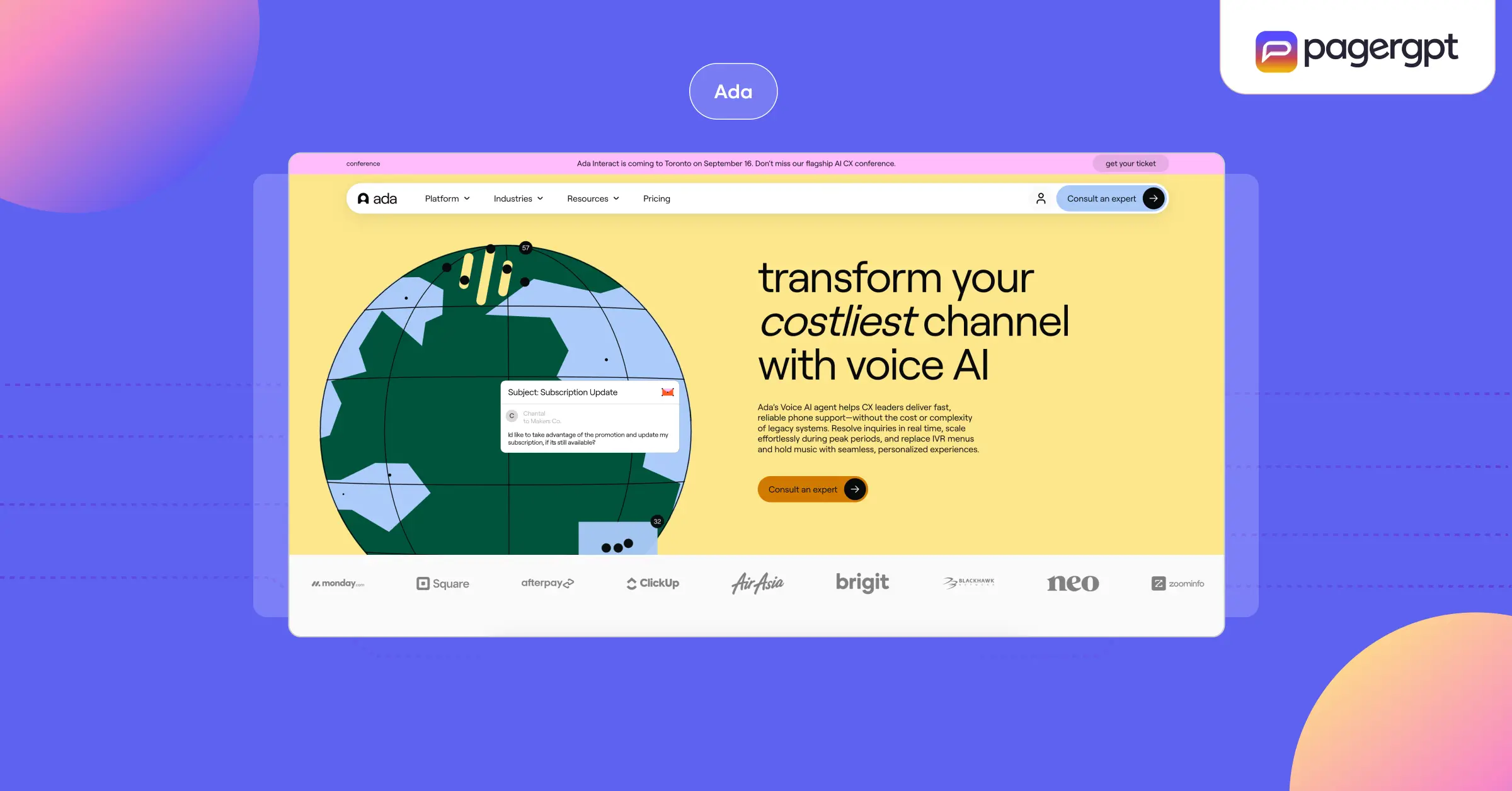
Key features of Ada:
Reasoning‑powered AI agent: Ada’s core uses a multi-step Reasoning Engine™ that interprets intent, retrieves knowledge, plans next actions, and executes automations or responses based on your SOPs.
AI coaching & sandbox testing: Administrators can train agents using playbooks and simulated conversations, test behavior in sandbox environments, and measure performance improvements over time.
Global multilingual support: The platform supports over 50 languages, making it well-suited for your global support operations.
Pros
Easy-to-use: Ada is easy to use for users as they can leverage the drag-and-drop components, such as text boxes, images, and videos, to set up automated support.
No-code AI coaching: This feature enables AI agents to receive frequent suggestions, improving their performance and providing exceptional support.
Cons
Integration issues: Ada limits flexible integrations with modern help desk tools, such as ZohoDesk, forcing users to switch to other platforms and incur data migration costs.
Faulty auto-translations: The auto-translation feature is observed to produce incorrect translations when translating languages due to non-compliance with conditional blocks.
Pricing: Custom pricing
Freshchat
Freshchat is Freshworks’ customer messaging platform designed to unify conversations across chat, email, social media, and messaging apps, all from a single dashboard. The platform offers Freddy AI agent that helps teams deliver fast, personalized support at scale.
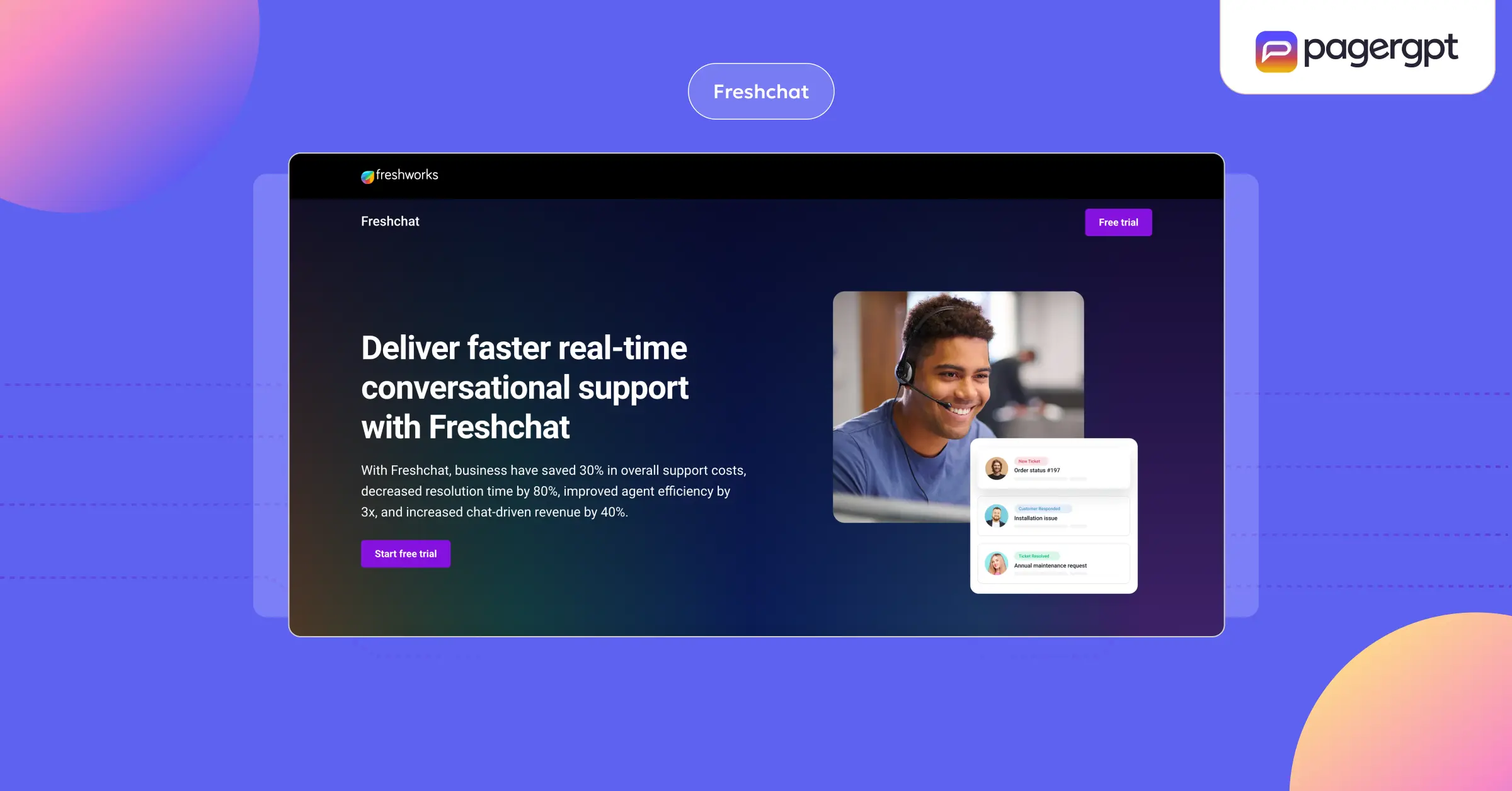
Key features of Freshchat:
Freddy AI agent: Freddy’s customer-facing agent uses your help center, uploaded files, and public URLs to answer common questions, assist with tasks like checking order status or processing refunds, and hold multi-step conversations.
Intelligent routing and automation: The platform uses intent detection and workflow automation to assign tickets to the right agent based on skills, workload, or language, ensuring customers are routed to the right agent.
Workflow automations: Create rules that assign, prioritize, or close tickets based on triggers or time conditions. This cuts manual steps and keeps tickets moving.
Pros
Intuitive dashboard: Freshchat’s dashboards provide comprehensive insights into bot deflection rates, session duration, trends in queries, and more.
Seamless integration: You can get customization workflows by integrating industry-leading platforms.
Cons
Limited customization: The platform lacks extensive customization options, which prevents users from creating advanced functionalities for their workflows.
Steep learning curve: Users report that advanced features, such as automation rules and custom objects, need extensive customization.
Pricing
Free Plan: $0
Growth: $19 /agent/month, billed annually
Pro: $49/agent/month, billed annually
Enterprise: $79/agent/month, billed annually
Botsonic
Botsonic by Writesonic is a no-code platform for building AI agents trained on your business data. You can integrate the platform with your existing tech stack to automate various customer service tasks, such as creating tickets, answering common questions, booking appointments, and more.
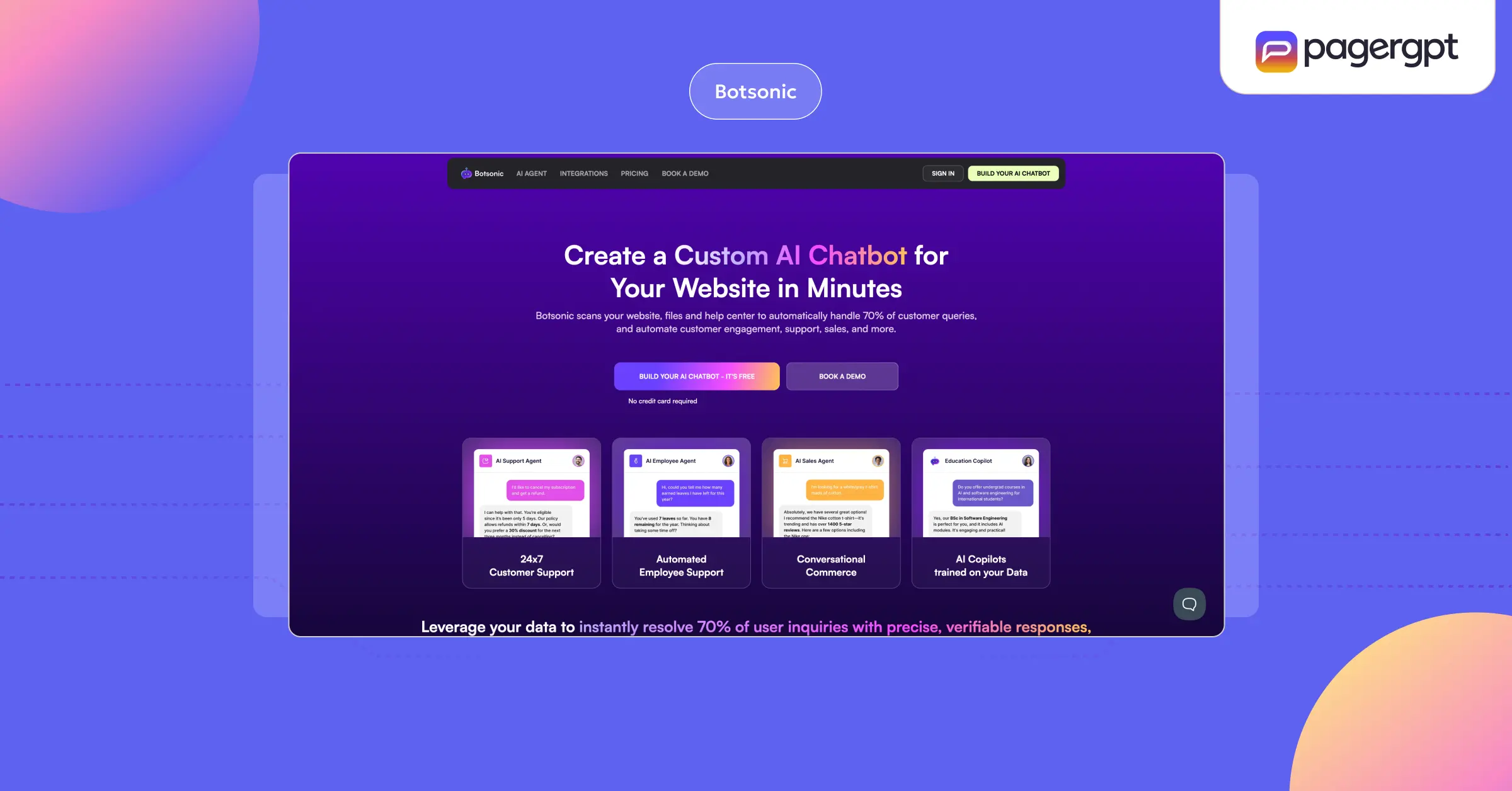
Key features of Botsonic:
Multilingual support: With Botsonic, you can support customer interactions in 50 different languages.
Customization options: Botsonic offers extensive customization to align chatbots with brand identity, including modifying colors, logos, bot names, and conversation flows.
Analytics and chat history: The platform provides you with insights into chatbot performance and user interactions, enabling continuous improvement and optimization.
Pros
Easy to use: Users highlight the clean UI and simple navigation, making the bot training and configuration process smooth and accessible.
Helpful prompt suggestions: The platform provides prompt suggestions that enhance the user experience and effectively guide interactions.
Cons
No real-time support for JS-heavy websites: The website scraper does not support JavaScript-rendered pages, making it difficult to extract live data from modern JS-based websites.
Inconsistent response accuracy: Users report that, despite using GPT-3.5 and uploading plenty of information, the bot sometimes fails to provide correct or complete answers, especially without extensive FAQ training.
Pricing
Starter: $16/month (billed annually) or $19/month (billed monthly)
Professional: $41/month (billed annually) or $49/month (billed monthly)
Advanced: $249/month (billed annually) or $299/month (billed monthly)
Enterprise: Custom pricing
Chatbase
Chatbase is an AI agent platform that allows businesses to train, test, and deploy AI agents without any coding. It offers a wide range of features to enhance customer service, including smart escalation, AI actions, advanced analytics, and more.
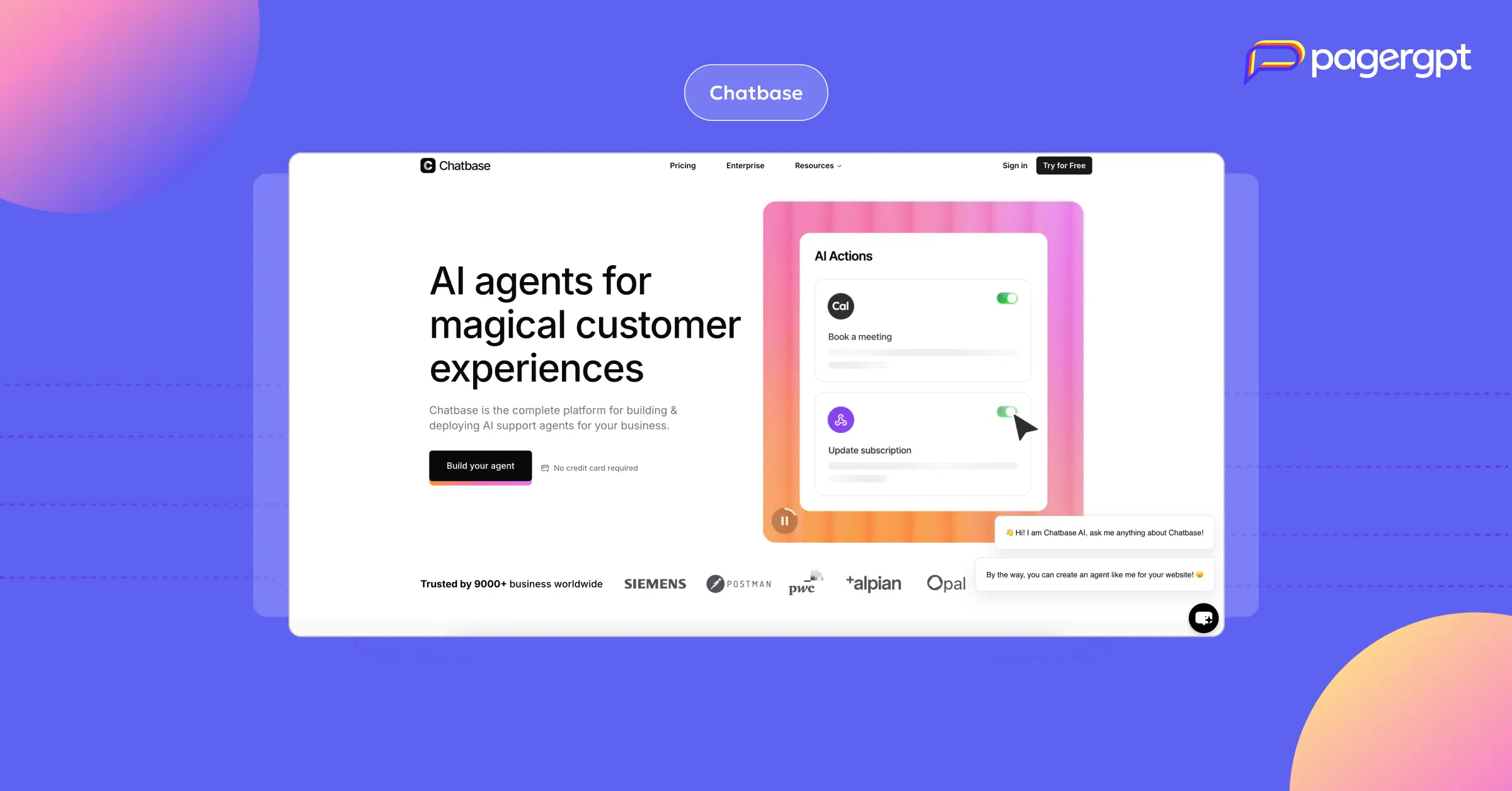
Key features of Chatbase:
Smart escalation: You can instruct your AI agent in plain language on when to escalate queries to human agents.
Advanced analytics: You can monitor AI agent interactions to gain insights into user behavior and improve performance over time.
AI actions: You can define specific actions for the AI agent to perform, such as booking an appointment or creating tickets.
Pros
Quick deployment: Chatbase allows businesses to deploy chatbots without technical expertise.
Advanced chatbot analytics: Chatbase helps identify conversation gaps and optimize chatbot performance, leading to enhanced customer experiences and increased conversions.
Cons
Inconsistent performance with GPT models: Some users report that ChatGPT-4o integration often fails or provides inaccurate responses.
Limited customization: Users report challenges in tailoring dashboards and prompts for specific business needs.
Pricing
Free plan
Hobby: $40/month or $384 billed annually
Standard: $150/month or $1440 billed annually
Pro: $500/month or $4800 billed annually
Watermelon
Watermelon is a popular software that helps businesses build, deploy, and manage AI Agents that automate various functions across sales, marketing, HR, and customer support functions. With this solution, your organization can improve operations and overall productivity.
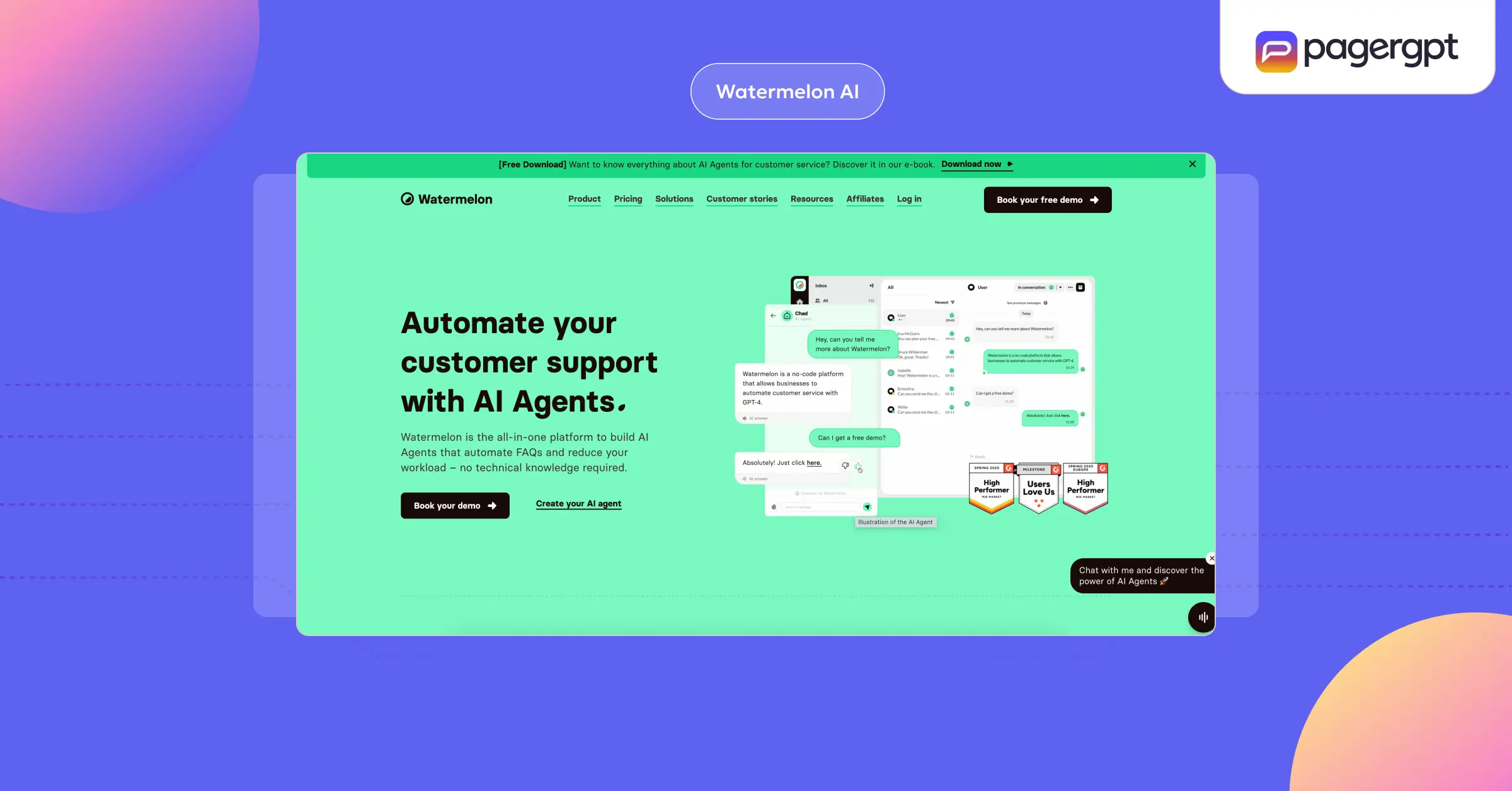
Key features of Watermelon:
Shared inbox: This feature enables AI agents to collaborate with your human agents in a unified inbox, facilitating the handling of complex issues.
Multilingual support: The AI Agent automatically detects and adapts to the user's language. It offers support in over 100 languages.
Omnichannel integration: You can connect the AI Agent to channels such as WhatsApp, Facebook Messenger, Instagram, and a customizable website chat widget, providing consistent support across multiple platforms.
Pros
Reduces support team workload: The platform helps automate routine inquiries, easing the pressure during peak times and reducing operational costs.
Personalized customer interaction: The platform’s customization options help users personalize customer experiences.
Cons
Lacks multi-user collaboration: Multiple users cannot work in the system simultaneously, limiting team productivity.
Limited lead form customization: Watermelon’s lead capture forms have limited capacity for customizations that would otherwise be helpful in aligning with branding and lead capture requirements.
Pricing
Basic: €159/month (billed monthly) or €106/month (billed annually)
Premium: €289/month (billed monthly) or €215/month (billed annually)
Business: €569/month (billed monthly) or €430/month (billed annually)
Enterprise: €1650/month (billed monthly and annually)
Aidbase
Aidbase is an AI-powered support platform designed to help SaaS startups, e-commerce, and marketplaces automate and enhance their customer service operations.
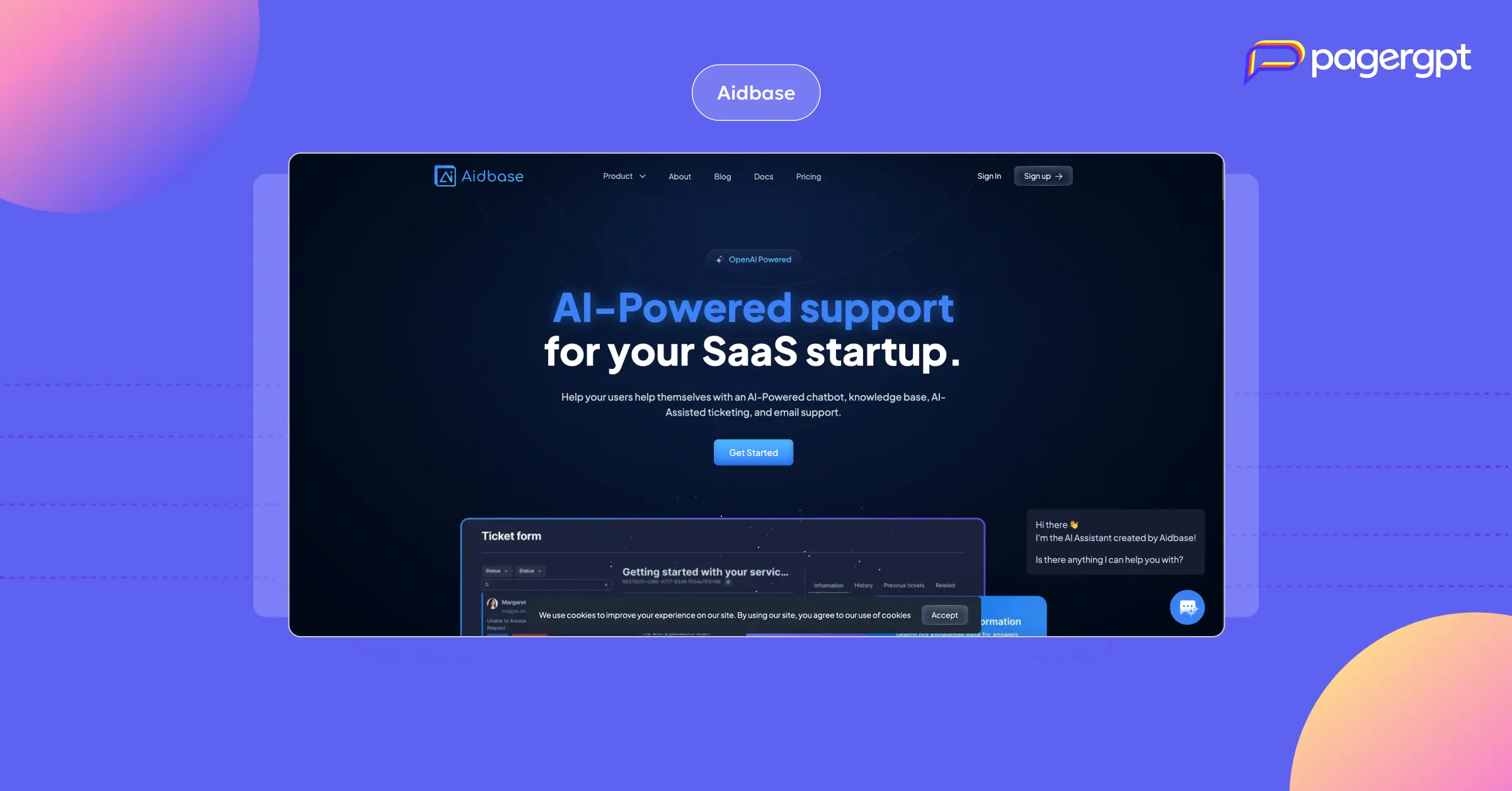
Key features of Aidbase:
AI chatbot: You can train the chatbot using your help docs, FAQs, and product information to provide accurate answers to customer queries.
Built-in FAQ & knowledge gap detection: Aidbase hosts an FAQ builder and can identify gaps in your knowledge base, prompting updates to train the chatbot more effectively.
Unified email inbox: The platform lets you manage all incoming support emails from a single inbox, facilitating efficient customer communication.
Pros
Simple and intuitive interface: Users find it easy to program and use, making it accessible even for those with limited technical skills.
Flexible testing and iteration: Users say the platform supports rapid prototyping and testing to analyze chatbot behavior and workflows.
Cons
Limited integrations: Aidbase currently lacks native integrations like WhatsApp, which may require workarounds for broader platform connectivity.
Early-stage product limitations: As a new tool, it still has some unfinished features, rough UI edges, and areas needing refinement.
Pricing
Standard: $22/month (billed annually) or $29/month (billed monthly)
Pro: $69/month (billed annually) or $99/month (billed monthly)
Expert: $279/month (billed annually) or $399/month (billed monthly)
CustomGPT
CustomGPT is a no-code platform that enables you to build AI agents for customer support. The platform supports 93 languages and integrates seamlessly with popular tools including Google Drive, Zendesk, Shopify, and Hubspot.
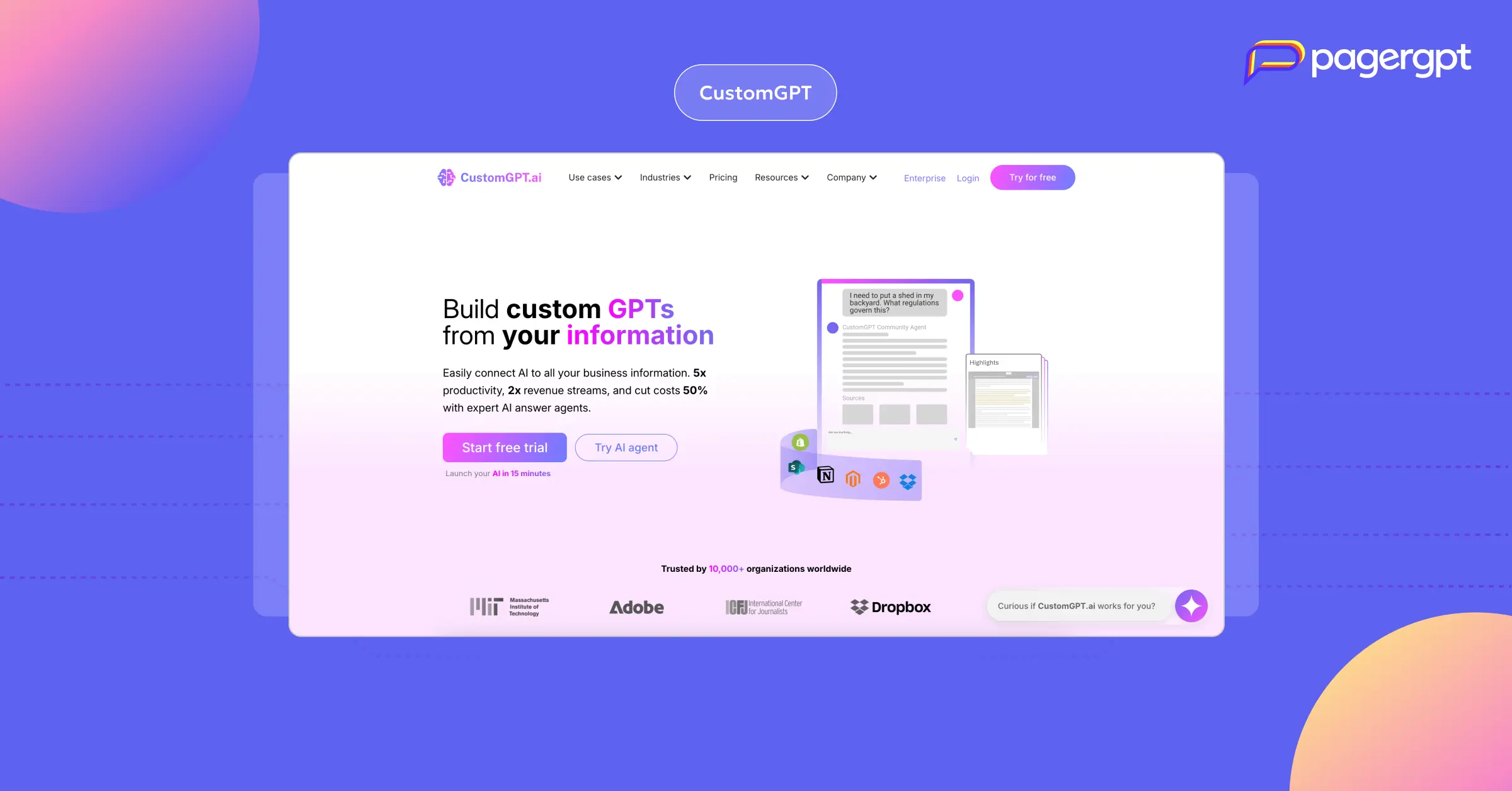
Key features of CustomGPT :
Multi-LLM models: The platform utilizes state-of-the-art language models, including OpenAI’s GPT-4, GPT-3.5 Turbo, and optionally Anthropic’s Claude, for enterprise needs. Automatically manages model selection and routing to balance cost and performance without manual intervention.
Analytics and reporting: The platform provides a comprehensive analytics dashboard that tracks query volumes, conversation history, token usage, and indexing status in real-time.
Data ingestion: The platform supports the ingestion of over 1,400 file formats via drag-and-drop or API. It can automatically transcribe multimedia content (YouTube videos, podcasts) with built-in OCR and speech-to-text technology.
Pros
User-friendly interface: According to user reviews, the platform is intuitive and easy to navigate.
Purpose-built for basic queries: Users mention that the AI agent can manage routine questions effectively.
Cons
Lack of memory retrieval between chats: Users say the chatbot does not retain past conversations, so every session starts from scratch.
Technical issues: User reviews mention frequent technical problems, slow response times, and difficulty retrieving information, even after proper data ingestion.
Pricing
Standard: $89/month (billed annually) or $99/month (billed monthly)
Premium: $449/month (billed annually) or $499/month (billed monthly)
Enterprise: Contact sales.
Zia AI by Zoho Desk
Zia is Zoho Desk's native AI assistant, built directly into the Zoho support platform. It intelligently automates ticket categorization, response drafting, and sentiment analysis, helping agents work faster, while providing customers with conversational self-service options.
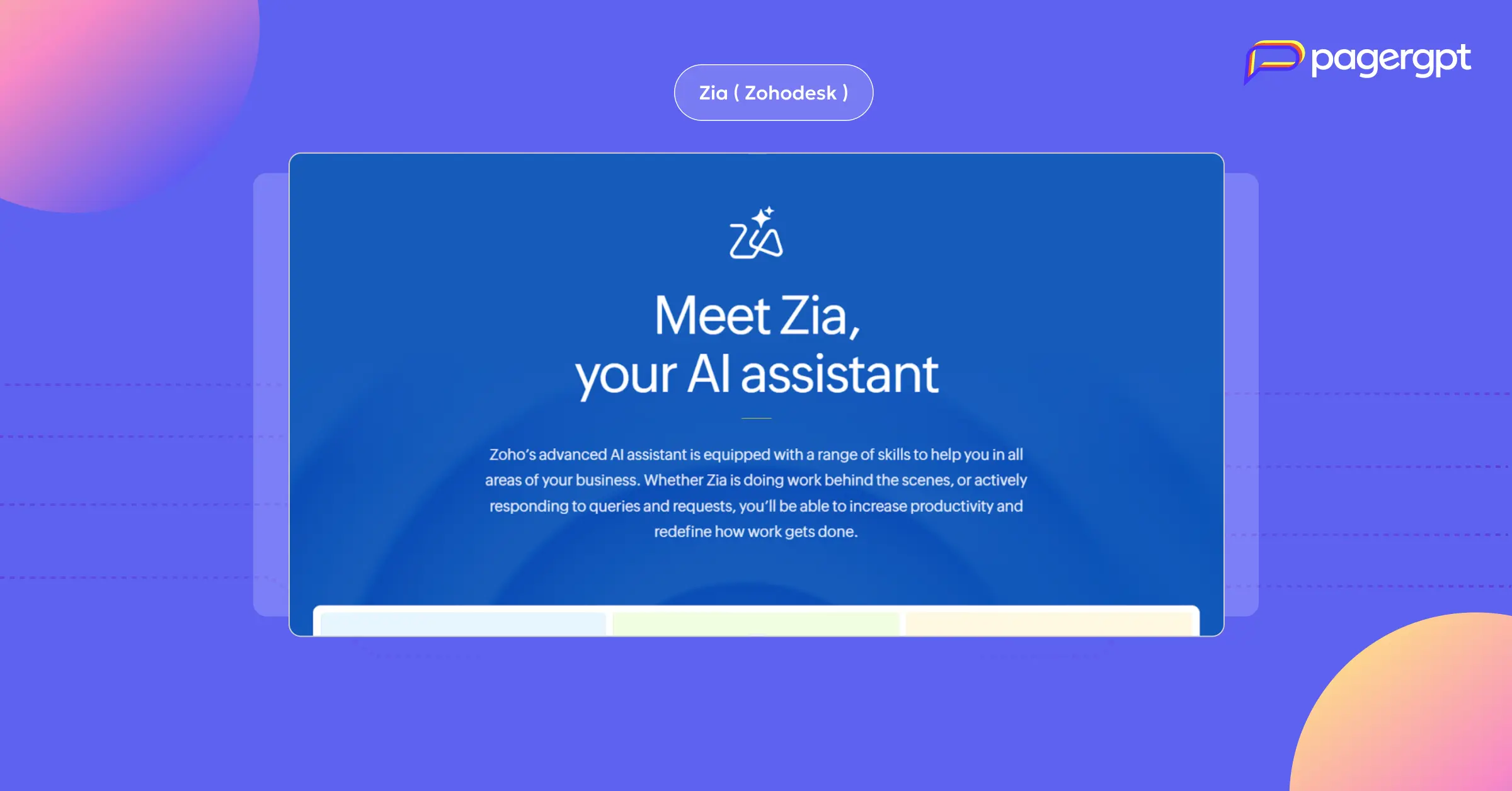
Key features of Zia AI:
Blueprint visual workflows: The drag-and-drop Blueprint builder enables you to map out and automate multi-stage processes, such as escalations or approvals, ensuring each ticket follows your defined steps.
Custom chat flows: Low-code templates allow creation of dynamic chatbots with branching logic, personalization, and integration blocks to execute actions or fetch data from other Zoho products.
Analytics and Insights: The platform allows you to monitor ticket volume, resolution time, sentiment, and bot performance to identify issues, measure impact, and improve support workflows.
Pros
Built-in AI assistance: AI features via Zia come at no extra cost, offering sentiment analysis and auto-triage without additional setup.
Strong ecosystem integration: Seamless integration with other Zoho products and access to a wide third-party marketplace make it easy to extend functionality.
Cons
Cluttered interface: Users report that the UI can feel unintuitive, particularly when setting up advanced features.
Limited analytics on lower plans: Tools like Radar and lifecycle reports are only available on higher-tier plans, restricting access for budget-conscious teams.
Pricing:
Starts at $9.52/user/month (billed yearly) and $15.48/user/month (billed monthly).
Botpress
Botpress enables companies to develop AI agents utilizing advanced AI models, deploy them across multiple channels, and create custom actions. Companies primarily use this platform to automate customer support, capture leads, and improve customer interactions.
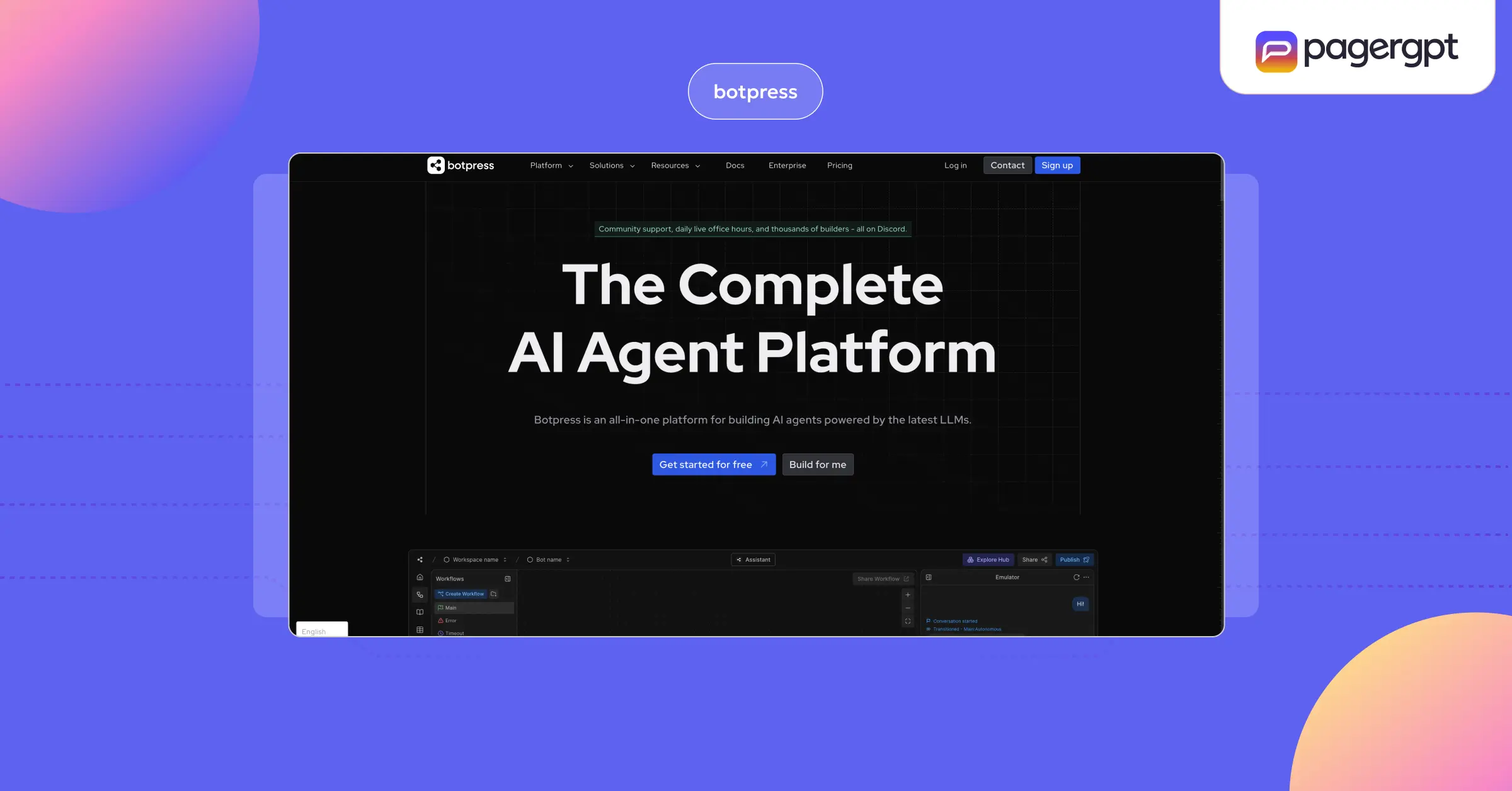
Key features of Botpress:
Autonomous Engine (LLMz): Botpress features a custom inference engine optimized for efficient memory-to-context management, allowing for the automation of complex conversations and workflows in a single, autonomous step.
Role-based access control: This feature allows you to grant individuals specific access rights based on their role, such as view-only or edit rights, ensuring that everyone sees and performs only what they need in the system.
Automated routing: Botpress integrates with various third-party tools, including Salesforce, Zendesk, ServiceNow, Oracle, Intercom, Genesis, and Twilio Flex. This helps route queries to the right support agents.
Pros
Personalized customer experience: Users appreciate the interactive and customized responses that improve user satisfaction.
Easy AI fine-tuning: Users appreciate the ability to fine-tune AI responses to better match their product needs.
Cons
High pricing: Users note that costs increase rapidly for companies with a high message volume or a need for advanced features.
Inconsistent emulator and live chat UI: Users report formatting differences between the test environment and live chat, resulting in design issues.
Pricing
Pay-as-you-go: Starting $0/month
Plus: $79/month (billed annually) or $89/month (billed monthly)
Team: $445/month (billed annually) or $495/month (billed monthly)
Enterprise: Contact Botpress.
What are the benefits of a customer service chatbot?
An intercom study reveals 70% of C-level support execs are planning to invest in AI, and for good reason. Here are the benefits of investing in AI chatbots and AI agents:
Improved self-service
According to Salesforce, 65% of customers prefer self-service for simple issues when available.
AI agents help by providing 24/7 support and auto-resolving 80% of repetitive queries without depending on a human agent.
Increase agent productivity
McKinsey found that AI agents can increase productivity in customer care by 30 to 45% by reducing manual work and speeding up resolutions.
This means your support team will have more bandwidth to focus on complex queries and ensure optimal use of resources.
Personalized customer experience
A report by Accenture showed that 91% of consumers are more likely to shop with brands that offer personalized experiences.
AI agents help meet this expectation by delivering context-aware answers tailored to each user. They adapt responses based on past conversations, behavior, preferences, and customer history, making support feel more relevant and human.
Improved customer satisfaction
44% of customers say fast and efficient resolution is the biggest driver of a positive support experience.
AI agents help deliver exactly that by resolving issues instantly, reducing wait times, and ensuring consistent, accurate responses every time.
Organizational cost savings
As your organization grows, AI agents can handle high volumes of queries with the same consistency and quality.
In fact, Gartner predicts that AI agents will autonomously resolve 80% of common customer service issues, leading to a 30% reduction in operational costs for support organizations.
Real-world use cases of customer service chatbots
AI chatbots and agents are already powering support at scale for some of the world’s most customer-focused brands. Here’s how companies like Amazon, Sephora, Canva, and HealthTap are putting them into action for different customer service use cases:
Amazon
Amazon integrates AI across every touchpoint of the shopping journey, from product search to post-purchase support.
Resolving repetitive queries: Rufus AI helps customers find the right product by answering common questions, providing comparisons, and offering tailored recommendations.
Hands-free support access: Alexa enables users to check order status, initiate returns, and manage shopping lists through simple voice commands.
Summarized review insights: AI highlights key pros and cons from user reviews directly on the product page, helping customers make quicker decisions.
Sephora
Sephora uses AI to personalize the beauty shopping experience while reducing common support requests through interactive tools and automation.
Virtual product testing: Virtual Artist uses augmented reality to let users try on thousands of makeup products digitally, helping them feel more confident before making a purchase.
Personalized recommendations: Color Match scans a customer’s skin tone and suggests the best-fitting foundation and concealer shades from Sephora’s inventory.
Streamlined appointment booking: Reservation Assistant on Facebook Messenger allows users to book in-store services through chat with just a few steps.
Canva
Canva integrates AI into the design process to help users create faster, get support instantly, and reduce back-and-forth with support teams.
Automating design workflows: Magic Studio features like Magic Write, Magic Design, and Magic Edit help users generate content, build layouts, and make edits without leaving the design screen.
On-demand support: Ask Canva answers product questions and walks users through features, providing help exactly when and where it’s needed.
Ensuring content safety: Canva Shield checks AI-generated content for potential risks and offers legal support for enterprise users in case of disputes.
HealthTap
HealthTap combines virtual care with AI to improve appointment prep, symptom assessment, and overall care delivery.
Pre-visit patient interviews: Dr. A.I. uses GPT-4 to gather symptom details and medical history before a consultation, giving doctors a clear summary before the call begins.
Instant symptom guidance: Symptom Checker lets users assess their condition and receive guidance in real time, reducing the need for immediate human triage.
Reducing administrative load: AI-generated visit summaries allow physicians to focus on diagnosis and treatment rather than data collection during the session.
Curious how other top companies like Walmart, Spotify, and GitHub use AI in customer service? Read our blog: 11 Companies that use AI for customer service
How do you choose the right customer service chatbot platform?
With so many tools available, choosing the right customer service chatbot can be overwhelming. But the best platforms have one thing in common: they help your team automate real support work without creating extra complexity for customers or your team members.
Here are seven key capabilities to look for when evaluating a customer service chatbot or AI agent platform:
Ease of implementation
Your team shouldn’t need engineering support just to get started. Look for no-code or low-code platforms that let non-technical users build, test, and launch chatbots through a simple visual interface. This shortens onboarding time and keeps setup costs low.
Robust training and customization
Your chatbot should learn from your content, not start from scratch. Choose a tool that allows you to train it using existing sources, such as help center articles, internal documents, or uploaded files. It should also allow you to customize responses, actions, and workflows, so the experience feels like a natural extension of your brand.
Custom AI workflows
Look for a platform that supports agentic AI workflows. You should be able to set priorities, auto-tag customer issues based on specific keywords, and define routing conditions to escalate urgent or unresolved issues.
This allows the AI agent to handle routine work independently, reduce response times, and ensure that complex issues are handed off to the right team member without delay.
Multichannel and multilingual support
Look for a platform that enables you to provide customer support across multiple channels, such as Slack, email, Instagram, or WhatsApp, and can handle queries in multiple languages.
Plus, the platform should collect and organize all customer queries from different channels in one single inbox, so that it’s easier for your team to collaborate and resolve issues.
Integration with your tech stack
A chatbot becomes much more useful when it can pull information from other tools and trigger actions in real time.
Look for platforms that integrate with your CRM, help desk, order system, and knowledge base. The more connected it is, the better it can resolve issues without human input.
Analytics and reporting capabilities
Choose a platform that tracks resolution rates, fallback triggers, query trends, and customer feedback. Clear insights help you improve content, train the bot further, and make smarter decisions over time.
Collaborative features
Your chatbot platform should make it easy to work as a team. Features like internal notes, @mentions, shared inboxes, and smart bot-to-agent handoff ensure your team can collaborate without switching tools or losing context.
Build your own AI-powered customer service chatbot with pagergpt
If you're looking to build an AI-powered support chatbot that goes beyond canned responses, pagergpt gives you the control and flexibility most platforms miss.
What sets pagergpt apart from other tools? pagergpt is explicitly built for CX teams and stands out for its no-code agent studio, shared-live inbox, AI copilots, and support for multiple LLMs.
You can create AI agents that not only give on-brand, accurate responses but also work well with your existing customer support stack to take actions like escalating queries and completing complex workflows.
Ready to build AI-first customer support? Try pagergpt today!
FAQs
What are the different types of chatbots in customer service?
There are rule-based bots for simple tasks, AI-powered bots for smarter conversations, voice bots for spoken interactions, and agentic AI agents like those built with pagergpt for end-to-end automation and complex workflows.
What is the role of AI chatbots in customer service?
AI chatbots handle repetitive queries, personalize support, and reduce manual workload. Tools like pagergpt go further by enabling agents to take actions, escalate issues, and collaborate with human teams in real time.
Can I use a chatbot without coding skills?
Yes. No-code platforms like pagergpt let you build and deploy AI agents without writing a single line of code. You can use templates, plug in your data, and launch within minutes.
Can I use ChatGPT for customer service?
While ChatGPT offers fast, scalable responses, it often hallucinates facts, lacks true understanding of user intent or emotion, and struggles with integration into live support workflows.
pagergpt, by contrast, uses your company’s data to ground responses, supports sentiment detection, intelligent routing, and seamless human handoffs, all via a no‑code interface.
Engage website visitors instantly,
resolve customer queries faster.
Do more than bots with pagergpt
About the Author

Content Writer
Narayani is a content marketer and storyteller with a focus on digital transformation in the B2B SaaS space. She writes about enhancing employee and customer experiences through technology. A lifelong learner, she enjoys reading, crocheting, and volunteering in her free time.
